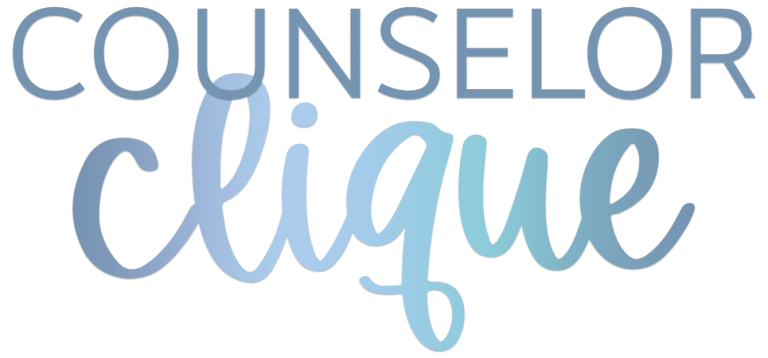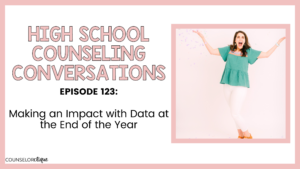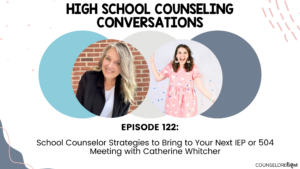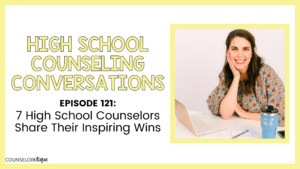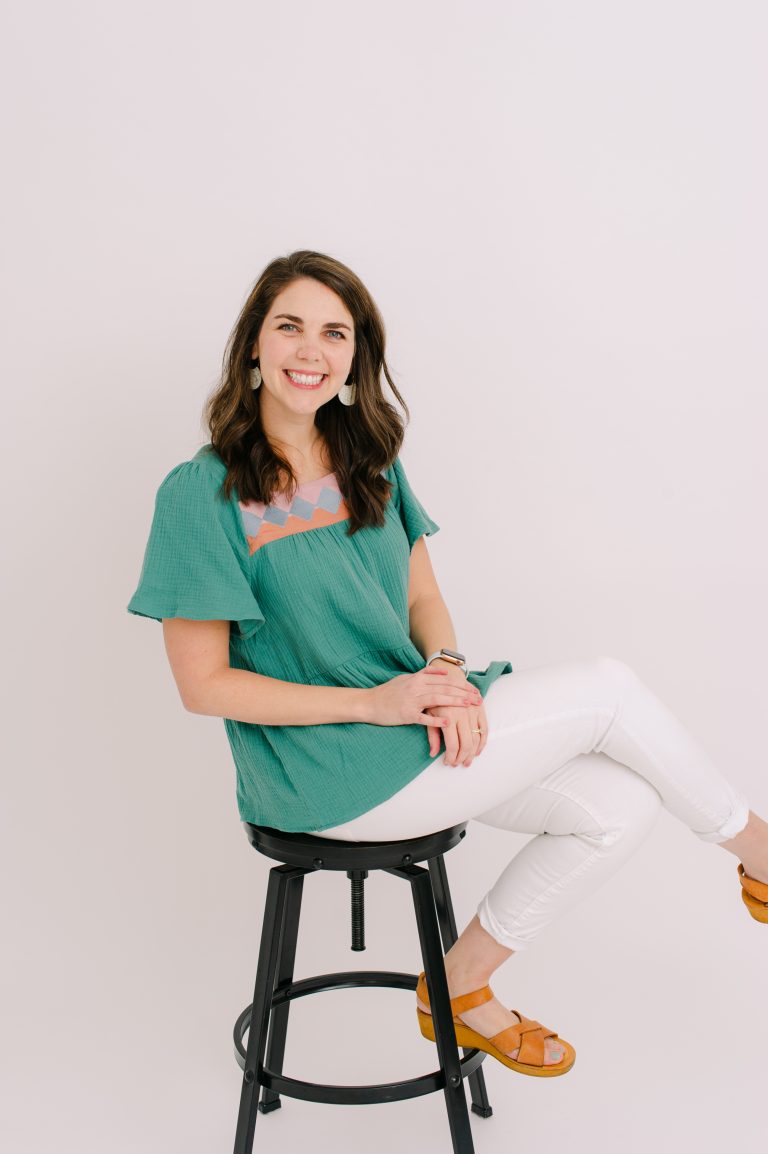
Here's What to Expect In This Episode:
As high school counselors, doing classroom lessons is part of the job and helps us stay connected to students and their needs. However, most of our lessons tend to focus on the essentials of scholarship programs, financial aid literacy, reading transcripts, and so much more academically. Instead, I want to give you some counseling classroom lesson ideas that involve social-emotional learning.
In order to have a proactive counseling program, we need to provide and teach our students the necessary skills they need to be successful. I’m sharing six counseling classroom lesson ideas that do just that, along with sample activities and how each lesson can look in the classroom. Since we can’t give lessons every day to the same students, we need to make sure what we’re presenting is engaging so students remember and use the skills we taught them.
If you’re looking for fresh and new but also important and informative counseling classroom lesson ideas, I’ve got you covered! By presenting my six favorite lessons, you will engage your students while also giving them skills to practice and master as independent adults.
Topics Covered in This Episode:
- 6 counseling classroom lesson ideas you can present to students
- Why these lessons are focused on social-emotional learning
- How to make each lesson engaging and memorable for students
- Ways to make the lessons relevant to the real world and their current situation and experiences
Resources Mentioned in This Episode:
- Resource: Free Classroom Lesson Roadmap
- Free Podcast Playlist: Classroom Lessons Playlist
- Resource: Goal Setting and Soft Skills Classroom Lesson
- Resource: Communicating Feelings and Interacting with Others Classroom Lesson
- Resource: Healthy Relationships Classroom Lesson
- Resource: Growth Mindset Classroom Lesson
- Resource: Coping Skills Classroom Lesson
- Resource: Stress on the Brain and Body Classroom Lesson
- Leave your review for School Counseling Conversations on Apple Podcasts
Other Blog Posts You Might Like:
- Podcast: Episode 13, How to Bring Social-Emotional Learning into High School Core Curriculum
- Podcast: Episode 117, How Do I Start Taking Action on Classroom Lessons As a High School Counselor?
- Blog: Pro Tips for Classroom Lessons: Target These 6 Teacher Types to Increase Reach
- Blog: How to Incorporate Social-Emotional Learning Learning into High School Classroom Counseling Lessons
Read the transcript for this episode:
Lauren Tingle 0:00
Do you need some ideas for how to incorporate classroom lessons into your high school counseling program? I’m going to walk you through some of my favorite high school counseling classroom lessons and how you could implement them in your program. I hope this gives you some ideas of where to start if you’re not already doing classroom lessons, or if you’re ready to spice up some of your lessons.
Lauren Tingle 0:20
Consider pairing with another counselor to do lessons together because I swear this makes it way more fun. Or push into a health science class or a PE class or partner with any teacher in your building who sees value in these topics. If you have an intern this year, this will be a great podcast episode for them to listen to you to build their confidence around classroom lessons or to get their wheels turning to take some ownership or initiative to bring some new lessons into your building. Pass this episode along to them and you will not regret it.
Lauren Tingle 0:50
I’ll preface this episode too with all of these resources that I mentioned will be linked in the show notes. And you can also find them bundled together with even more than I’m going to talk about in this episode, all in the show notes. If you’re ready to go all in on classroom lessons, make sure you head there and grab the bundle and get 20% off. So you can check all that out when you’re done listening. Just go ahead and focus on the topic at hand.
Lauren Tingle 1:14
You can decide when you want to do these lessons throughout the whole scheme of the year. Or I’m also including a sample sheet in the show notes that sort of walks you through what kind of order you could do these in if you choose to do them monthly. It’s up to you. You can have complete flexibility, or you could follow a little roadmap that I’ve included.
Lauren Tingle 1:33
And then of course, if you want a full year long curriculum map of what to do and when to do it in your entire high school counseling program, join us Inside the Click Collaborative as an annual member and grab your high school counseling curriculum app as an exclusive bonus just for annual members.
Lauren Tingle 1:50
Okay, let’s get into some actual counseling lessons that you could do in your classroom. I’m mostly going to focus more on the social emotional ideas that you could be incorporating, because I’m willing to bet that the scholarship presentations, the financial aid literacy presentations, reading transcripts, all of that academic stuff, you probably already cover pretty in depth because those are your non negotiables when it comes to classroom lessons.
Lauren Tingle 2:17
Like if you’re making time to get into the classroom, it’s probably going to have to do with it being an academic lesson, right? Social emotional lessons sort of find their way to the bottom of the to do list because they can feel like extra things that our students don’t really need or that teachers don’t really think students need.
Lauren Tingle 2:35
But we know as counselors that if we want to be putting together a proactive program, one that addresses all the tiers, one that’s not all about putting out fires all day every day, we have to be teaching our students the skills that they need to be successful when it comes to things like communication and healthy relationships and coping skills. These are the things we want to have them practicing while they’re here in our high school with us so they can master them by the time they launch out into the real world as independent functioning young adults.
Lauren Tingle 2:49
Let’s get into six classroom lessons that you could incorporate into your school year. Pick one or two, or make it a goal to work them all in. I’ll walk you through what sorts of activities are inside of them and you can start thinking about what it might be like to introduce these SEL classroom lessons to your high school students. So let’s get into it.
Lauren Tingle 3:08
First up, this is a great one for the beginning of the school year: goal setting and soft skills classroom lesson. I’ve seen counselors and even teachers find this resource helpful at connecting the dots between the hypothetical what’s to come and the real world. It’s wild how students don’t really know some simple things like how to address an envelope or how to write a thank you note or how to write a semi professional email. I say semi because like it doesn’t even have to be super formal.
Lauren Tingle 4:33
They’re just really lacking in some basic skills in this arena. Like, let me tell you, you probably are thinking of the same example that I’m thinking of when you get an email and everything is in the subject line. Like I just cringe thinking about it because by the time they’re in high school you would think they have figured this out but they have not so I digress.
Lauren Tingle 4:54
So the lesson starts with a presentation on goal setting and soft skills. What they are just learning the basic, setting some goals. Then it moves into some concrete examples and practices some different forms of communication that we want them to master: verbal communication nonverbal communication written communication. And at the end of this lesson, students have sent a professional email and a written thank you note to either be sent in the mail or deliver to someone in the school building.
Lauren Tingle 5:21
Next up communicating feelings and interacting with others classroom lesson. I’ve seen this lesson used with eighth grade all the way through high school grades, and it definitely spans that age range and does really well engaging them all.
Lauren Tingle 5:34
From our individual counseling sessions, we know that teenagers these days have a really hard time identifying their feelings, and then communicating those feelings with others. This lesson gets students up and moving around the classroom, and also gets them interacting with each other and practicing the things that we are learning.
Lauren Tingle 5:52
I don’t know how many times I’ve heard my own students or other counselors, students say, These situations are so real, like, Did you read my journal? Did you read my text messages to my friends, when I give them these conversation cards or these situations to think through together. It’s like we have some experience working with high schoolers or something that we’d be able to come up with situations that hit close to home for them to think about.
Lauren Tingle 6:16
The situational cards, make them discuss what they’d actually do and say, when they find themselves in a sticky situation where maybe there’s a lot of gray area, and there’s not even a black or white answer to be had. And notice I said when they found themselves in a situation because it’s not if they do, they will find themselves in a situation where they don’t know what to do or say because it’s either really awkward, or it’s just a situation they never thought they would find themselves in.
Lauren Tingle 6:42
I love hearing them think through the situations and problems together and decide what’s best as a group.
Lauren Tingle 6:49
Next up along the same lines of practicing they’re communicating of their feelings, the Healthy Relationships classroom lesson is one of my favorites is another relational lesson. Are we sensing a theme here for our high school students needs?
Lauren Tingle 7:03
There are slides to introduce this topic to your students before you get into the activities. Because then there are many things we can all agree on in a healthy relationship. But students and I would say people in general, are allowed to rate just the qualities in a relationship in different orders according to what is most important to them.
Lauren Tingle 7:23
So first things first, students will examine the importance of their own values, and then values in a relationship whether that’s a friendship relationship, a romantic relationship, a family relationship, and they’ll use an inventory to do that. I give them a lot of values, like put them in front of them to choose from to get them thinking, but they can also write in their own values. And then they rank them one through 10, which is very informative, because everyone’s are going to be different, it’s going to be unique to the individual.
Lauren Tingle 7:50
There are also conversation cards in here because I think hearing how people process these things is absolutely intriguing. These can be done in pairs, in small groups, or even as reflection questions in a journal individually.
Lauren Tingle 8:03
I’ve also used this lesson with a group of parenting and pregnant high school students to think through what they want in their relationships as they embark on raising a child. What their relationship will look like with their child, how their relationships might change with their peers, and how they can have healthy relationships with their family members, even with big changes happening in their lives.
Lauren Tingle 8:21
Next is that growth mindset classroom lesson. Who doesn’t love a good creative coloring activity? High schoolers do not get to do that enough so here we are.
Lauren Tingle 9:12
After you introduce the topic of growth mindset to your student with 20ish slides about what growth mindset is and why it’s important, time to get out your coloring utensils because students are going to color in their brain with what is occupying it. Honestly, it’s a good thing for us to think through as adults too if we give ourselves some space to do it.
Lauren Tingle 9:32
To check for their understanding around growth mindset, they’ll do a sticky note activity to match definitions with some of the terms they just learned. We want this stuff to stick long after we leave the classroom with them. And because we’re probably going into classrooms so infrequently, if I had to guess many of you have large caseload, not enough counselors and seemingly not enough hours in the day, SEL gets pushed to the backburner and I don’t blame you.
Lauren Tingle 9:56
Well, we’re doing it so infrequently we want these lessons to be memorable. And I think as we make an effort to do more of them and to have engaging lessons at our fingertips to do them, students will start remembering and using the skills we’re teaching them. And that’s a good feeling. It’s a good thing to be proactive and teaching students these skills so that we’re not being reactive and constantly putting out fires.
Lauren Tingle 10:20
The coping skills classroom lesson is next. This lesson includes some craftiness and sound reflection. Students will get a giant list of coping skills to reference which will help them long after this classroom lesson, they can hang on to it, but it’ll definitely help them during it too.
Lauren Tingle 10:36
They’ll examine coping skills that they need to remember to use at school. And everyone’s will be different for them. They’ll identify them, and it will be fun and interesting for them to examine them for themselves, and then share out what they’re learning and see how that’s different from other people.
Lauren Tingle 10:51
Then they get to take it back to when they were kids and create one of those little fortune tellers of sorts, you know, the little ones that like, open with your hands, I’m doing the hand motion here, but I wish you could see it where you like Count 123456. And then you do A B, C, D, or whatever the different messages that it says on there, and then you open up that corner. Yes, you remember the one I’m talking about?
Lauren Tingle 11:15
I love activities where students can walk away with something both memorable and practical that triggers their mind and makes them say, oh, yeah, I made this during school today with the counselor when they get home and see it. Hopefully, it’s not crushed in their backpack.
Lauren Tingle 11:29
The next topic is a popular one, and will be really helpful for a lot of your students to do in a classroom lesson setting: stress on the brain and body. Now, stress on the brain and body is relatable to almost everyone I would say. And I think if you’re saying it’s not relatable to you, then you have to be lying. We’ve all experienced stress at one point or another in our lives. And we feel its implications in both our brain and our body.
Lauren Tingle 11:56
The psychology behind stress and how it affects us, especially in long term states is fascinating. And maybe that’s just the counselor and me talking. But I do think students love learning about this stuff.
Lauren Tingle 12:08
It gives them vocabulary and meaning behind what they’re already feeling, and helps them understand why their body is going through what it’s going through. And it helps them feel not as alone because there is actual scientific reasoning, why their brain and their bodies are reacting to their life circumstances.
Lauren Tingle 12:26
I loved making this classroom lesson and I think you’ll love playing it. It’s a game show to learn about stress. After you learn some basic facts about the brain body and stress through some PowerPoint slides, you’ll play a Jeopardy style game with your students. A truly interactive classroom lesson where you click through the slides keep score and potentially reward a winner.
Lauren Tingle 12:46
So pro tip bring some candy or some stickers for prizes. Students are really surprisingly motivated by treats like that. This game will take a bit to get through especially going back and forth between the teams hashing through some of the answers, you’ll enjoy some fun and light hearted communication between your students as they learn about stress management in this classroom lesson.
Lauren Tingle 13:07
So there you have it, there are six lessons that you could do in the classroom. If any of those sounded appealing to you, then go into the show notes and click on them and read a little bit more about them. But hopefully, I laid out for you what some of those lessons could look like or feel like in your classroom setting.
Lauren Tingle 13:24
Remember, you could really do these classroom lessons in any order that you wanted to. But I’ll link a quick PDF guide that is just a document in Google Drive that gives you an example of an order to do these lessons in.
Lauren Tingle 13:36
Now, it’s completely up to you of the order. But I know some people want an example of an exact roadmap in front of them, to help them make some decisions and make some big moves happen. So I want to make this easy for you. So I’m including that roadmap in the show notes. But if you want a quick link to it, it’s going to be counselorclique.com/classroomroadmap, and that’s how you get it.
Lauren Tingle 13:57
If all of these sounds up your alley, when you buy them all together, plus more than I didn’t talk about, you’ll get 20% off of the bundle. So that’s linked in the show notes as well.
Lauren Tingle 14:07
And then if you’re wondering how to implement all of these because classroom lessons feel super intimidating. Don’t forget to go to the show notes and get that Spotify playlist, right in your playlist. You’ll click on it, you’ll save it. And it is a bunch of podcast episodes all about classroom lessons. So things about increasing your confidence and making it happen getting those classroom lessons on your calendar, forging those relationships with teachers to make it happen. That link is in the show notes as well.
Lauren Tingle 14:37
So hopefully you heard something that you can take away from this episode. I hope you enjoyed it. Send me a DM on Instagram, if you are going to put classroom lessons on your calendar for the rest of this semester. I’ll see you here next week.
Connect with Lauren:
Cheers + Happy Listening!
Like what you’re hearing? Follow and leave a review on Apple Podcasts. It helps other high school counseling friends find it!
Can’t contain your excitement? Share the pod! Tell a friend! Your word-of-mouth referrals mean the world to me!

